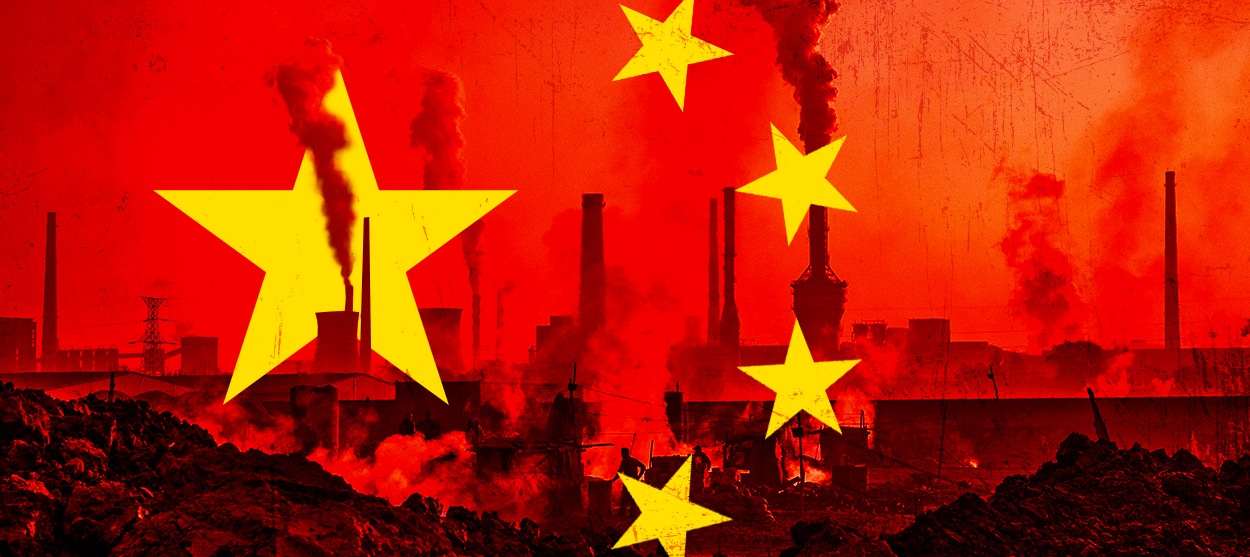Is China going to destroy itself and everyone else with coal?
It doesn't look good


For many years, China has been the world leader in green energy, directing massive subsidies toward solar panels, wind, and other renewable technology. But it has also been the world leader in greenhouse gas emissions, putting out about twice as much as the United States, the second largest emitter, today. It appeared as recently as 2017 that the Chinese government — recognizing its extreme vulnerability to climate change, and its ability to cook human society completely by itself — would tip toward the green end of the scale.
But not now. China is radically scaling back its green subsidies, and ramping up its coal power investment. China, it seems, cannot be relied on for any kind of climate leadership. If it is up to Xi Jinping and the Chinese Communist Party (CCP), they and everyone else will be fried.
"Chinese investment in clean energy is plummeting — down from $76 billion during the first half of 2017, to $29 billion during the first half of this year," reports Leslie Hook at the Financial Times. Meanwhile it is planning to add 148 gigawatts of new coal power capacity — just one gigawatt short of the entire European Union coal fleet. Meanwhile, China's massive Belt and Road imperial investment project is spreading low-grade coal power across half the planet, including to places that previously had little access to it like Egypt and Pakistan. Partly as a result, world greenhouse emissions were up 1.7 percent last year. The Chinese pivot back to coal, should it be completed, all but ensures devastating climate impacts for the world in general and China in particular.
Subscribe to The Week
Escape your echo chamber. Get the facts behind the news, plus analysis from multiple perspectives.

Sign up for The Week's Free Newsletters
From our morning news briefing to a weekly Good News Newsletter, get the best of The Week delivered directly to your inbox.
From our morning news briefing to a weekly Good News Newsletter, get the best of The Week delivered directly to your inbox.
So what is going on? The main reason, FT reports, is the slowing economy. China has run squarely into middle-income country problems, where mainly investment-led growth must give way to consumer-led growth. That's a challenging transition for any country, and it's happening at the same time that its largest trade partner started an enormously damaging trade war for no good reason. Growth is at its lowest point in more than 20 years, and so the party has dropped everything to try to boost it back up.
But just as important is the brutally authoritarian character of CCP rule. Like all dictatorships, the Chinese state struggles with consent and fears rebellion; it relies on an enormous police and surveillance apparatus to stifle dissent, and perpetual economic growth to buy off a population that has few freedoms. The CCP simply can't pursue a normal democratic government strategy, which would be to rely on the legitimacy of an electoral victory and explain to the population that lower growth is simply the price to be paid so Shanghai isn't drowned by the rising seas.
Worse, President Xi Jinping appears to have some of the classic diseases of dictators. He has consolidated power in his own hands, and has a paranoid fear of subversion. Under his watch the Chinese state has imprisoned perhaps a million Uyghur Muslims in appalling concentration camps, and set up the most pervasive AI-backed surveillance state in world history. Far from creating some ultra-efficient techno-dystopia, as Henry Farrell writes in some ways it appears to be enabling the CCP's worst impulses. A CCP attempt to strengthen its grip over Hong Kong only led to stupendous street protests, lent desperation by the Uyghur example. In recent elections there, the pro-Beijing candidates were trounced. There "is a very plausible set of mechanisms under which machine learning and related techniques may turn out to be a disaster for authoritarianism, reinforcing its weaknesses rather than its strengths, by increasing its tendency to bad decision making, and reducing further the possibility of negative feedback that could help correct against errors," Farrell writes.
In other words, it may be impossible for the Chinese state to see that its strategic interest relies on cutting out fossil fuel power.
Now, some blame must fall on the United States and President Trump for all this as well. He has pulled out of the Paris Climate Accords, and enabled a substantial ramp-up in American fossil-fuel production and consumption, throwing a wrench in all other nation's efforts to cut emissions. (Why bother if the U.S. isn't going to pull its weight?) Trump's trade war has destabilized China, prompting the CCP to turn inward, while to this day it's not even clear what Trump wants from China (probably because he has no idea himself), and hence it is not clear what China could do to stop it.
But ultimately, that is no excuse. From 1991 until quite recently, the United States was the unchallenged global hegemon, and used that lack of accountability to go on an imperialist crime spree of jaw-dropping proportions. Whole subcontinents were torched in our madcap quest to spread "democracy" (that is, capitalism) at the barrel of a gun. So as China has risen to displace the U.S. as the world's largest economy, it seemed that perhaps even an Orwellian dictatorship couldn't be any worse. Instead, China has fallen at the first hurdle. It is still by far the largest greenhouse gas emitter in the world, and by sheer mechanical necessity must play a major role in any global climate policy. Now, both of the top global powers are pulling in the wrong direction on the biggest problem in human history. If the U.S. (which at least could theoretically change direction) doesn't get its act together soon, it's hard to see how that might be stopped.
Want more essential commentary and analysis like this delivered straight to your inbox? Sign up for The Week's "Today's best articles" newsletter here.
A free daily email with the biggest news stories of the day – and the best features from TheWeek.com
Ryan Cooper is a national correspondent at TheWeek.com. His work has appeared in the Washington Monthly, The New Republic, and the Washington Post.
-
 The last words and final moments of 40 presidents
The last words and final moments of 40 presidentsThe Explainer Some are eloquent quotes worthy of the holders of the highest office in the nation, and others... aren't
-
 The JFK files: the truth at last?
The JFK files: the truth at last?In The Spotlight More than 64,000 previously classified documents relating the 1963 assassination of John F. Kennedy have been released by the Trump administration
-
 'Seriously, not literally': how should the world take Donald Trump?
'Seriously, not literally': how should the world take Donald Trump?Today's big question White House rhetoric and reality look likely to become increasingly blurred
-
 Will Trump's 'madman' strategy pay off?
Will Trump's 'madman' strategy pay off?Today's Big Question Incoming US president likes to seem unpredictable but, this time round, world leaders could be wise to his playbook
-
 Democrats vs. Republicans: which party are the billionaires backing?
Democrats vs. Republicans: which party are the billionaires backing?The Explainer Younger tech titans join 'boys' club throwing money and support' behind President Trump, while older plutocrats quietly rebuke new administration
-
 US election: where things stand with one week to go
US election: where things stand with one week to goThe Explainer Harris' lead in the polls has been narrowing in Trump's favour, but her campaign remains 'cautiously optimistic'
-
 Is Trump okay?
Is Trump okay?Today's Big Question Former president's mental fitness and alleged cognitive decline firmly back in the spotlight after 'bizarre' town hall event
-
 The life and times of Kamala Harris
The life and times of Kamala HarrisThe Explainer The vice-president is narrowly leading the race to become the next US president. How did she get to where she is now?



